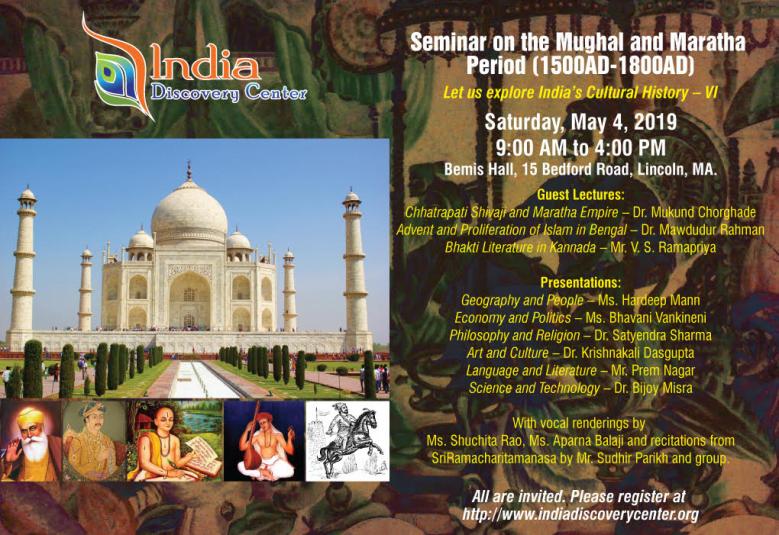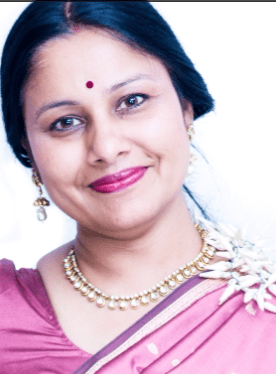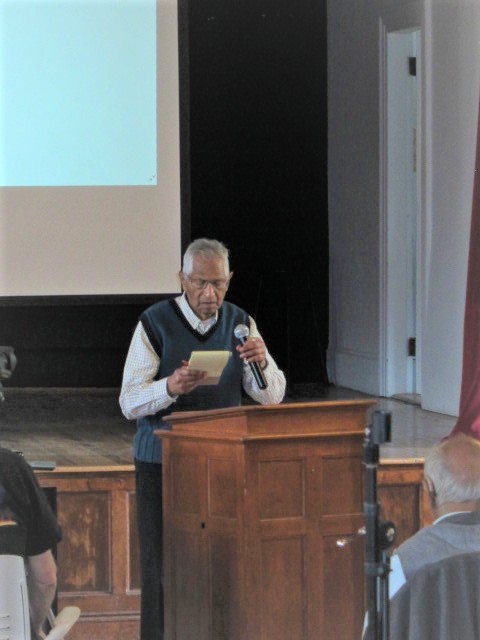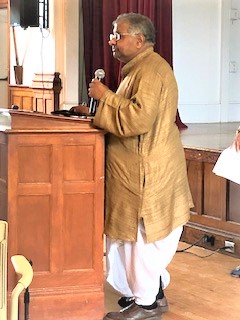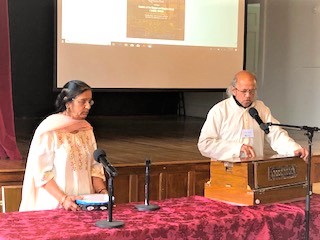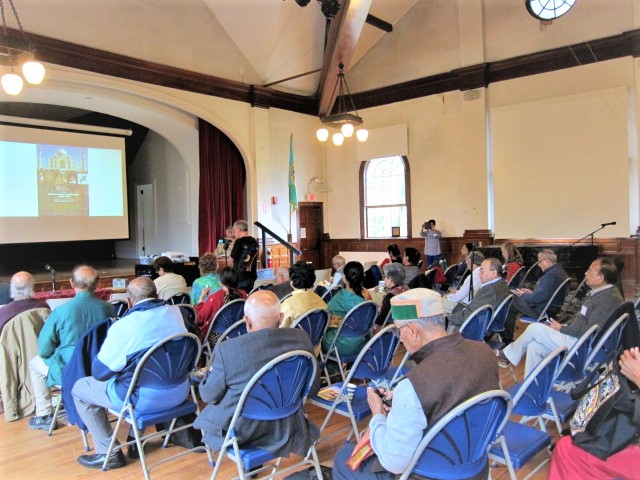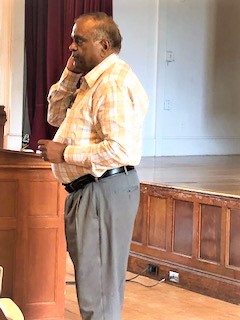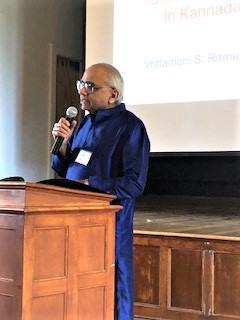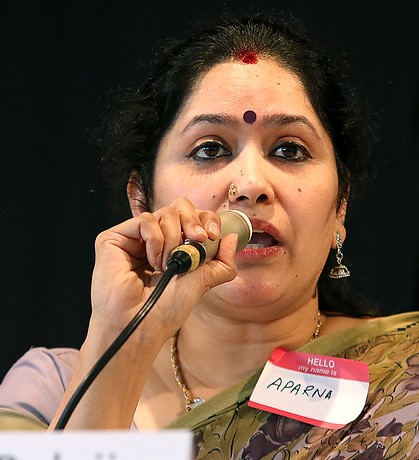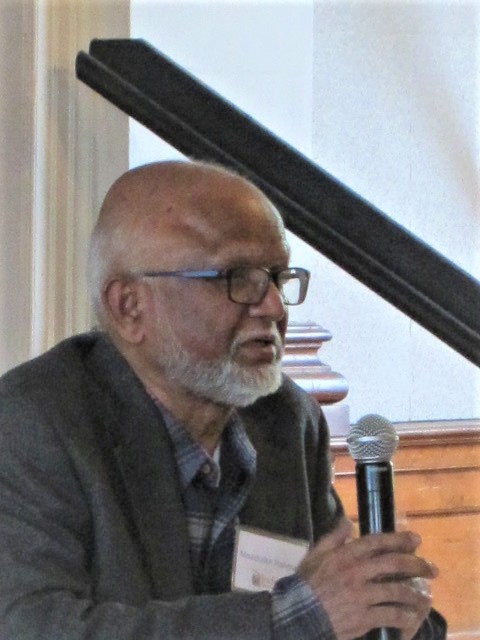Contribute
|
A Period Of Struggle And Resistance Mughal-Maratha Period (1500-1800 CE) |
Prem Nagar
05/23/2019
On a pleasant spring morning of May 4, 2019, seventy persons of different backgrounds converged at Bemis Hall in Lincoln for a day-long event to reflect on the cultural history of India during the period 1500AD-1800AD. This was the sixth such seminar hosted by India Discovery Center of Lincoln under the banner “Let us Explore the Cultural History of Indiaâ€. Organized in six tracks, the seminar was composed of the presentations and the invited lectures. The period music was added to help reconstruct the cultural life during the period. The seminar began with an invocation by Professor Vimal Prasad Jain with reading from the text Yogashastra of Acharya Hemachandra of 11th century AD. This was followed by a beautiful rendition of Sant Tukaram’s Sundrata te Dhyan by Ms. Shuchita Rao, a renowned vocalist from the area. The song set in Raga Yaman introduced the concept of abstract literature called Abhang (unitariness) that developed in Maharashtra. Ms. Rao was accompanied by Mr. Yogeesh Bhat, a promising young table professional visiting from India. Dr. Bijoy Misra, President of India Discovery Center, introduced the seminar and narrated briefly the progress of the seminars that began in 2016. He tried to create a feel of the cultural life and the opulence in India in 16th century by presenting excerpts from historical documents from the Mughal courts. Among the citations were Abul Fazl from the court of Akbar and Francois Bernier from the court of Auranzeb. He gave examples on the literary life during the period by reading excerpts from Akbar’s court poetry, material from Sant Ramdas in Maharastra and the poet Purandara Dasa in Karnataka. This report divided into two parts summarizes the events and the presentations in the seminar. Part I (present one) comprises of the summary of the guest lectures and the musical interludes. Part II will comprise of the summary of the track presentations and the Question and Answer session. The seminar began at 9:30 AM and ended at 4 PM in the afternoon. Food and drinks were arranged at the site. Guest Lectures: The first guest speaker was Dr. Mawdudur Rahman, Professor Emeritus of Business Management in Suffolk University. With a broad title “Advent and Proliferation of Islam in Bengalâ€, he examined the settlements in Bengal as part of Islamic expansion. More land was brought under cultivation and rice, cotton, jute, and opium were cultivated by the incoming Turkish settlers. During the Mughal times, Bengal produced half of the exports from the country to the foreign lands. Dhaka was the muslin capital of the world. Based on first British census conducted in 1901, around 52% of population reported to have Islamic beliefs. The second guest lecture was by Dr. Mukund Chorghade, an Adjunct in the Department of Chemistry at Harvard University. Identifying himself descending from the families that were part of the Maratha brigade of Shivaji, he reconstructed Shivaji’s life and struggle with flair and eloquence. Shivaji’s upbringing, his home education with his mother and his determination to gain freedom for the country were narrated. The Peshavas following Shivaji ruled almost two thirds of the country. The rule however could not be sustained due to internal rivalries and improper management. The third guest lecture on “Bhakti Literature in Kannada†was presented by Mr. V. S. Ramapriya, a volunteer at the local Chinmaya Mission. Bhakti Movement started in South in 800 CE and spread through the country. This had huge impact in the Karnataka Region. Purandara Dasa (1484- 1564 CE) is reported to have composed four hundred seventyfive thousand poems in Krishna’s devotion. Many were organized in melodic structure and sung today in Carnatic music. Swami Haridas (teacher of Tansen) was a student of Purandara Dasa. Similarly, Kanaka Dasa (1509–1609 CE), a poet, philosopher, musician and composer known for Keertanas and Ugabhoga, composed many compositions of Kannada language for Carnatic music. Music: Beside Ms. Shuchita Rao’s opening song, the seminar had the privilege of hosting Mr. Sudhirbhai and Mrs. Niruben Parikh’s duet presentation of SriHanuman Chalisa of Hindi poet Goswami Tulasi Das of sixteenth century. The pair, known for their yoga teaching and devotional services, rendered the words in a kirtan style performance with harmonium and manjira. SriHanuman Chalisa is considered as the first liberation call made by a poet to free India from the foreign rule. The third and final piece of music was a rendition of a piece from the seventeenth century Telugu poet Saint Tyagaraja. The students of Abhyasa school of music performed the song Bhakthi Bhikshameeyave under the director of the talented vocal teacher Ms. Aparna Balaji. The students were: Aniketh Chilukuri, Ananya Gade, Akshaya Napa Ramesh, Nikitha Arumugam, Srikar Mallajosyula, Sriram Krishnamoorthy, Synthia Kumar, Keshav Desibhatla, Smitha Rajan. Mridangam accompaniment was by Gautam Giridharan of Billerica, MA. Ms. Balaji followed up with another melody. The busy and reflective day ended with the recitation of the famous lyric of Poet Rabindranath Tagore celebrating India as a land of many people of different origins coexisting on her shores. The song “Mahamanaber sagaratire†was recited by Poet Sajed Kamal followed by the recitation of the English translation done by him. The support of Town of Lincoln for the facilities and the arrangements was acknowledged. The lunch was catered buy Holi Restaurant of Bedford, MA. Mr. Hardik Dixit, Ms. Parul Sharma, Ms. Neena Wahi and Ms. Geetha Patil helped out with the onsite work. The photographs were taken by Dr. Jaidev Dasgupta. India Discovery Center is a non-profit educational institution based in Lincoln, MA. https://www.indiadiscoverycenter.org Question can be directed to Dr. Bijoy Misra at misra.bijoy@gmail.com.
You may also access this article through our web-site http://www.lokvani.com/
